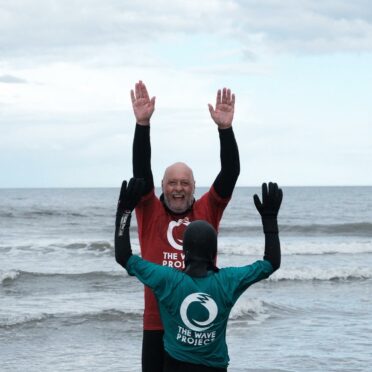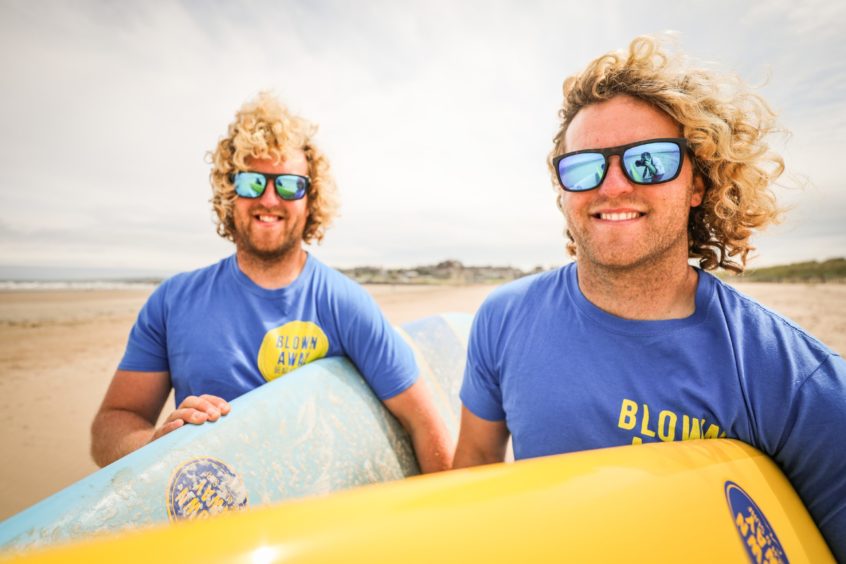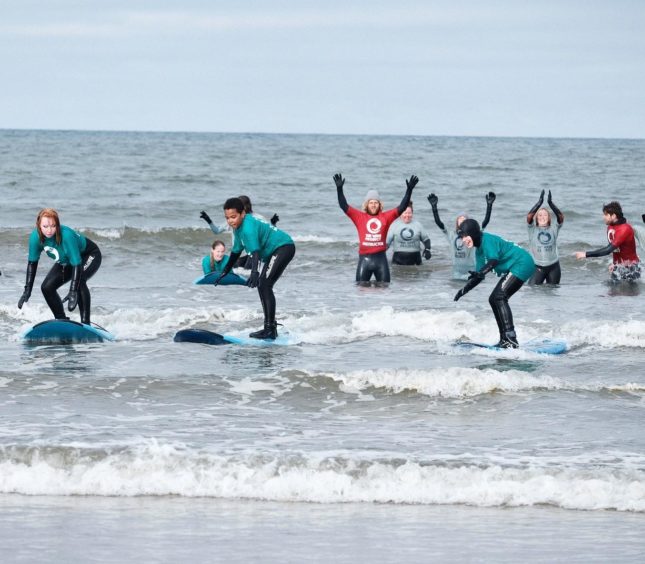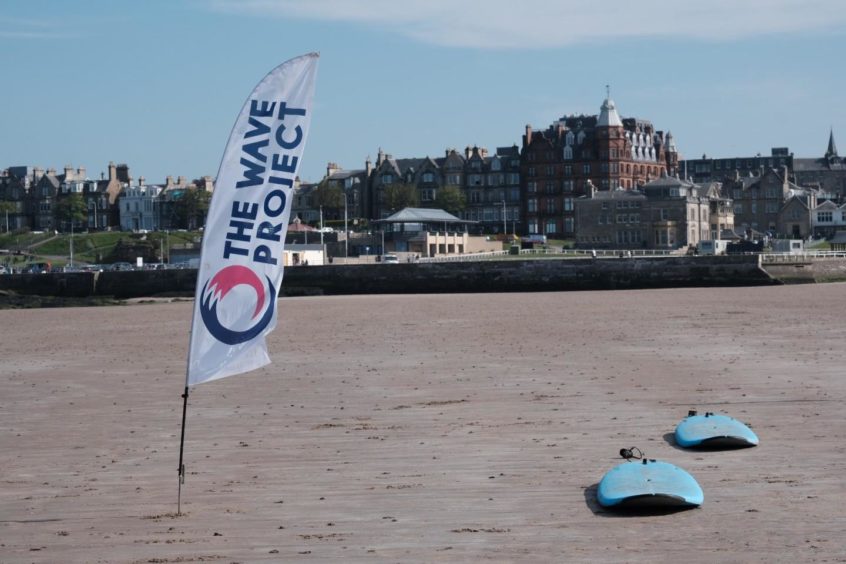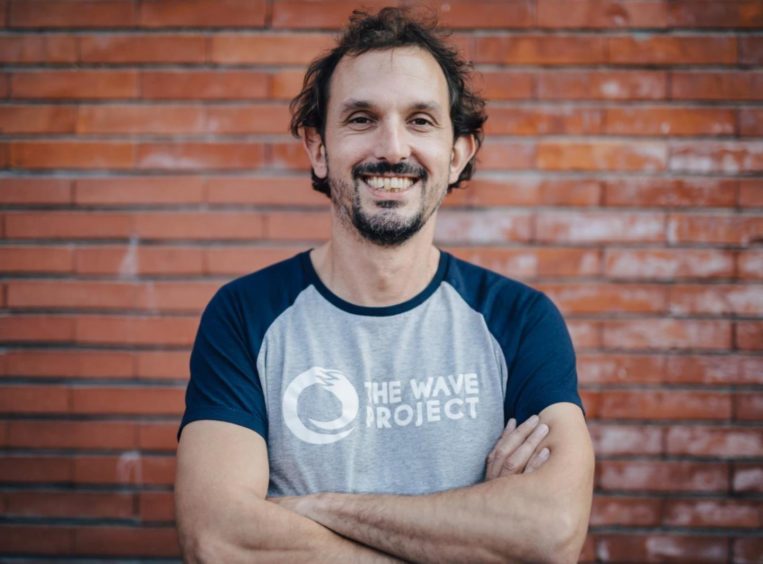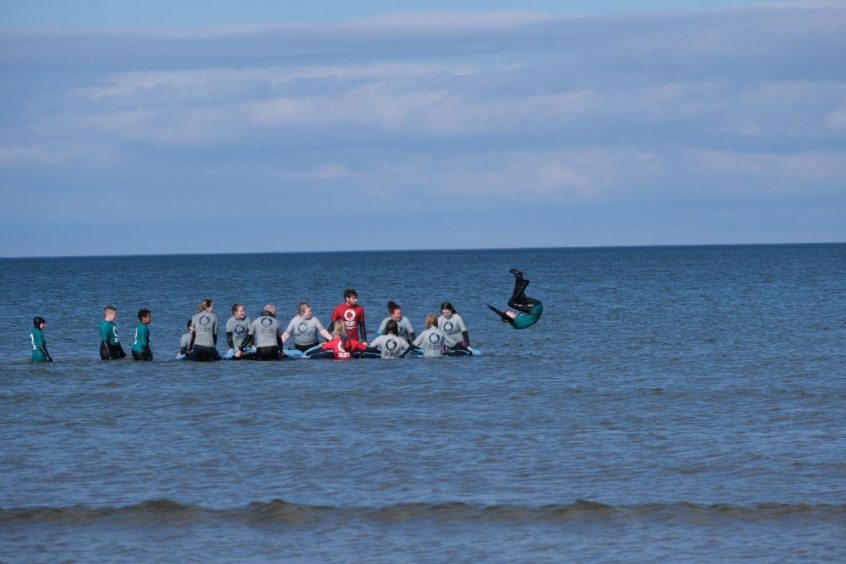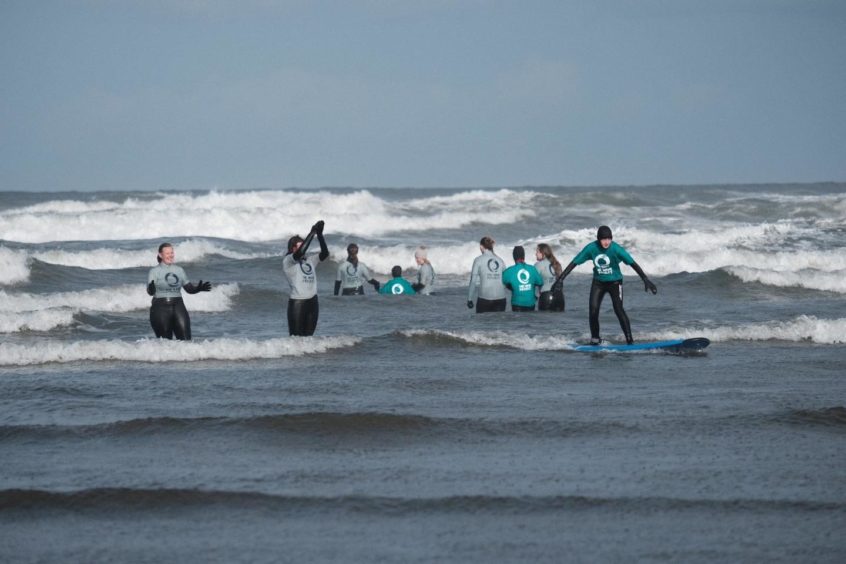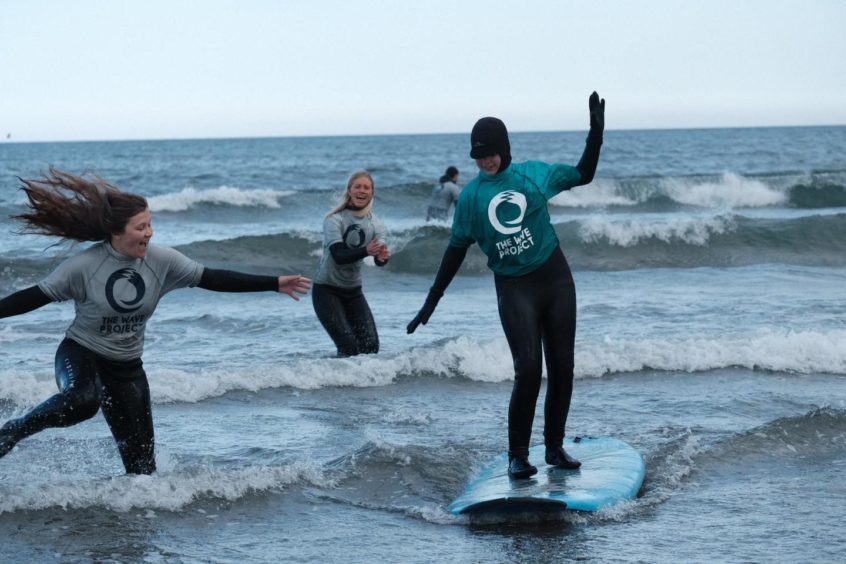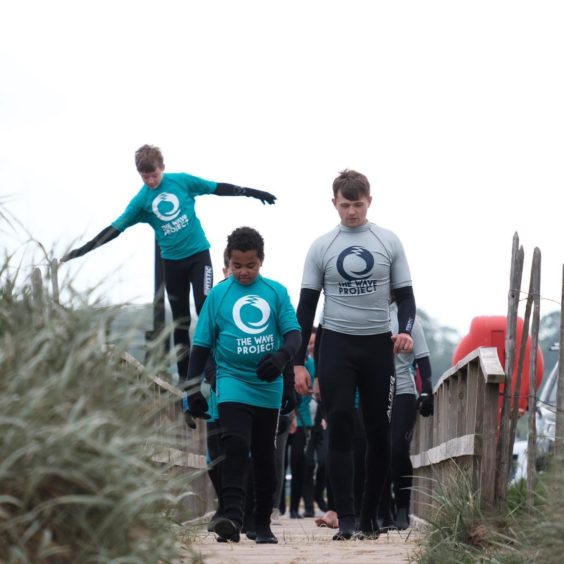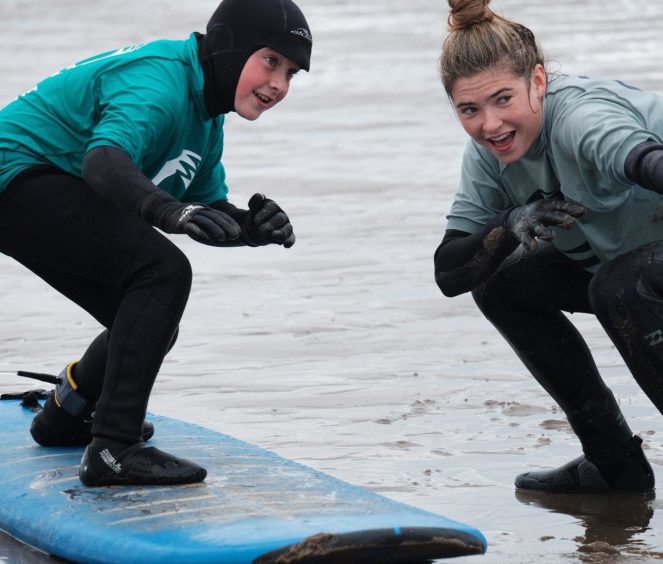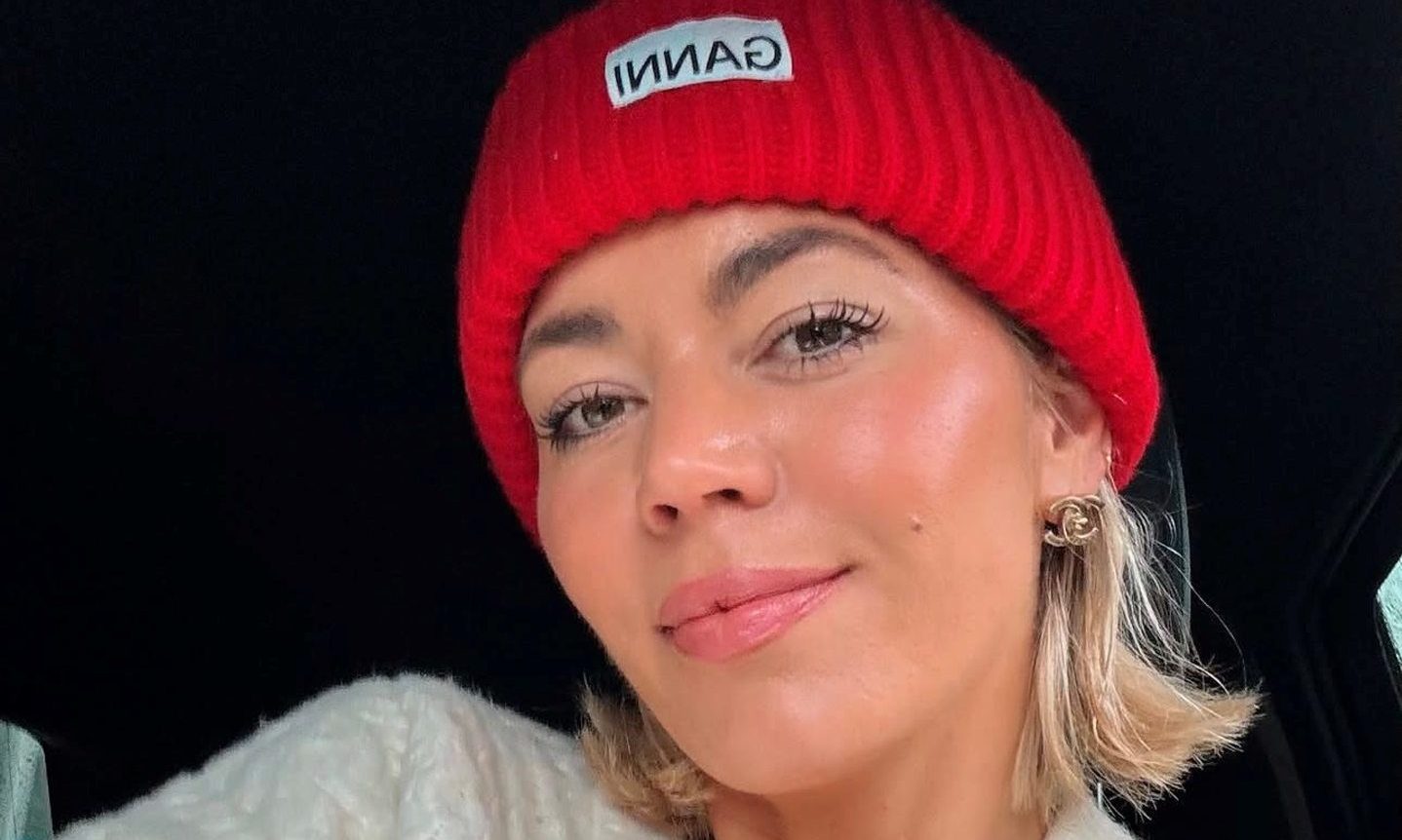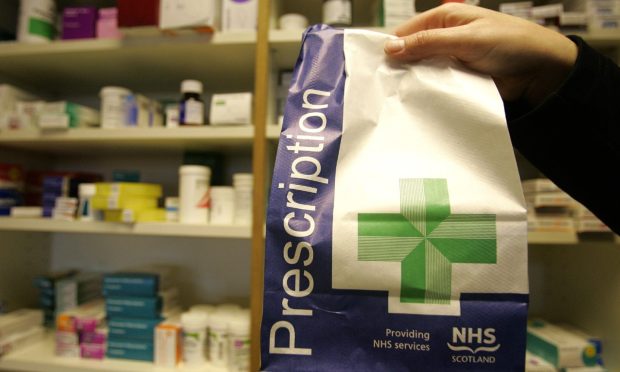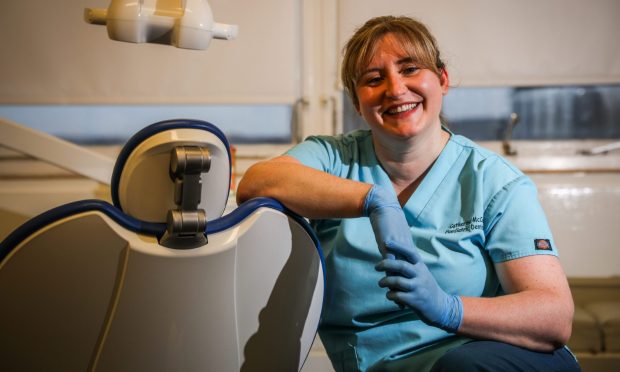The premise is fairly simple: take a group of young people who are facing challenges with their mental health and teach them to surf. For anyone who has been lucky enough to be involved in surf therapy through the Wave Project, the results speak for themselves – happy children enjoying the waves who also come away with increased confidence and reduced anxiety.
Guy McKenzie of Blown Away was delighted to be able to help bring the Wave Therapy sessions ‘home’ to St Andrews. Guy, his brother Jamie and their team welcomed participants to their beach activities base at the beautiful West Sands beach. “We had eight children from all over Fife booked in for a six week pilot programme,” he explains. “we were lucky that we had waves every week for them.”
The Blown Away crew provide surfboards, wetsuits and any other equipment that the young people need, while Guy has been delighted to have volunteers from both the local community and university on board. “We have a strong link to the uni, and locals from some of the sea swimming groups. The volunteers have quite a lot to do with helping get the kids into the water and assisting them onto the waves. There is lots of high-fiving and celebrating.”
Guy has been struck by the challenges that the young people face; “sometimes they don’t meet a lot of people, or they are a bit worried about getting into the water. You need to get them to trust you.” Once they get into the sea, however, the kids are hooked. “There is something calming about being in the water,” says Guy.
That calming effect is something that the founders of the Wave Project believe can really make a difference to our mental health.
Fife focus
Ruairidh Farquharson (25) is the coordinator for the project in St Andrews. “I got involved in the Wave Project in 2019,” he explains, “I had heard about the work they were doing, and was at a bit of a loose end with work so decided to go down and volunteer. I was immediately blown away by the work that Alison and the volunteers were doing.
“I really wanted to become more involved. Being a Wave Project volunteer is such a fulfilling experience. You meet really interesting people from a variety of backgrounds and the young people that attend are so amazing.”
Personal experience of the benefits of hitting the waves has made Ruairidh a keen advocate of surf therapy. “Surfing has been massively beneficial for me in my life, and I have seen the change it have on young people that attend the courses,” he enthuses.
Bringing the Wave Project to St Andrews has been a long term goal for Ruairidh and project founder and University of St Andrews Graduate Joe Taylor, as Ruairidh explains. “In 2018, the University of St Andrews Charities Campaign raised an incredible £21,000 for The Wave Project.
Plans for the project to be brought to St Andrews were halted due to the pandemic, but at the start of 2021, The Wave Project gave me the opportunity to bring a pilot scheme to the town. “The Wave Project is quite unique in its ability to support young people with a wide range of difficulties and challenges. Other therapies or opportunities tend to be for a specific group e.g. those with anxiety, those with autism, young carers, care experienced etc. whereas the Wave Projects caters for all young people and brings them together.
“Being in the sea can be amazing for the mental health of young people. One of the common things we hear is that when people come to the Wave Project, they leave their problems on the beach. Once they enter the water, they just need to focus on having fun and trying to catch waves. In that time, they can forget about whatever is going on in their life and just focus on the sea.”
Making surfing inclusive
Wave Project founder Joe Taylor got into surfing when he moved to Cornwall in 2000. He was interested in making the sport more accessible to people with disabilities. “It seemed to be very exclusionary at the time,” he says. “Together with another surf coach in Newquay, I tried to set up a surf club for people with disabilities and really that was where my initial idea of using surfing as a therapeutic tool came from.”
It was while running this surf school that Joe began to see how being in the water benefitted his participants. “I observed the change in demeanour and almost in personality of these young people going in for a surf – from being very anxious when they went in, to calmer, much happier, smiling and laughing when they came out. It just became really clear that there was something about that period of being in the water that was really beneficial for them.
Water therapy
“The Wave Project started in 2010, so that followed on from the disability project I’d been doing. I was keen to combine a volunteer surf mentor with a surfing lesson – that was really the idea of the Wave Project, linking those two things together. The idea that each person had their own mentor and that they wouldn’t be left on their own in the water was instinctively something that seemed like a good idea.
“The whole idea of surfing as therapy has really taken off,” he continues, “and the concepts of blue mind and water therapy. Those kinds of concepts really weren’t taken very seriously at all when I started the Wave Project, but that has changed now.”
For an ex-St Andrews student, bringing the project back to the Fife town has been a high point; “It was a very special achievement and I was very proud to be able to do it,” says Joe. “St Andrews is a town that is very special in my heart. I lived there for four years as a student, in an important time of my life. I also worked in a local pub in town and got to know people locally during my time there. I found the local community very welcoming to me personally, so to be able to come and give something back to the community in St Andrews and to local children all these years later is something I am really glad to be able to do.”
The children who have come to surf at the West Sands have been referred to the project by different services, as is the case across the UK, as Joe explains; “There can be a range of different issues including isolation, disability or general anxiety, which may have been caused by a traumatic experience, for example a bereavement, or linked to problems at home, school or wider social issues, or bullying.
“The common features of children referred to us are that they are quite anxious, find it hard to regulate their emotions, are quite isolated, and they don’t necessarily have the same opportunities that other children have to make friends or have positive life experiences.”
Accessible fun
The young people taking part benefit first and foremost from being in the sea: “there’s lots of evidence around how that’s really good for your emotional and mental health,” explains Joe, “just that whole idea of being outside, escaping from your problems and being in the water. I think surfing itself as a sport is really fun, it’s something children enjoy and get excited about without too much need for lots of training or preparation. They can just quite often jump straight in and I think for children that’s important.
“I think what the Wave Project brings is the emotional, supportive community around all of that. Children don’t feel like they can fail on a Wave Project course, they are always encouraged and praised and they are not rushed or pushed into doing things that they don’t want to do. So that rather laidback, surf approach is something that really works.
“We see that a combination of these things leads pretty consistently to improvements in children’s confidence, their social skills, resilience and ability to overcome other problems that they have, and their emotional regulation – their ability just to manage their emotions a bit better having done a course. Young people don’t give up as easily as they did when they started, they feel more positive about their lives generally, and better about their future prospects. These are all really important wellbeing measures that we see happen consistently and in quite a short timeframe – within the six-week surf therapy course.”
For Jamie Marshall, the idea of of hitting the surf for our mental health was so powerful that he has made it the subject of his PhD. “I am currently wrapping up the worlds first PhD focused on understanding surf therapy and how it relates to mental health,” he explains. “My published research has involved exploring projects using surf therapy to support youth mental health in the UK and Australia, US Marines with PTSD and young people living in post conflict Liberia.
“I started surfing at the age of 14 or 15 and after one lesson was hooked, I qualified as a surf instructor to earn money in my summers as an undergraduate (I studied at St Andrews at undergrad). Upon my graduation I piloted the first Wave Project iteration in Scotland in Dunbar, East Lothian (2014) and ran if for just under 5 years. During that time, I was intrigued as to how the surf therapy has the amazing positive impact we saw on the beach and undertook a part time MSc at University of Edinburgh to try and answer said question.
Leave your problems on the beach
“One of the most common quotes I hear is a variation on ‘you leave all your problems on the beach when you paddle out,’ and that was true for myself from day one. In terms of seeing it realised for others, when I was working summers as a surf instructor in Newquay (Cornwall) I was called in as cover for one of the Wave Projects initial set of courses and fell in love with the idea right away. It was evident there was so much more going on than just a surf lesson and my exposure to it in Cornwall led to bringing the concept back to Scotland.
“The research on physical activity’s positive relationship with mental health is clear and should be promoted in any form. There is emerging research suggesting that blue space (aquatic) activities do have an even greater impact, but further research needs to be carried out to confirm this,” says Jamie, who believes that, “interventions such as the Wave Project supplement this positive association with structures (such as safe spaces and celebration of little wins) that take this to the next level.” This idea of a safe space is particularly important as it can remove the pressures of an overly competitive environment.
“Surf therapy as delivered by the Wave Project has been associated with significant positive impacts on participant well-being alongside a host of other participant reported benefits such as improved confidence, hope, self-esteem, social competencies and physical fitness/strength. Surfing is a great vehicle to supporting these outcomes first due to the challenge it offers and the way they are celebrated within the Wave Project. Surfing, especially in the North Sea, is not easy and there are lots of little challenges involved from putting on wetsuit boots (which is just the worst!), to reading and catching the waves and finally standing up.
“All these little challenges are celebrated by the awesome team at surf therapy. You often hear quotes such as if I can do surfing, which is really difficult, I can do other things in my life that I think are maybe difficult such as school engagement or sticking with a difficult treatment schedule.”
All surfers fall off all the time, Jamie points out, “and surfing is a great reminder that when we fall, or wipe out, it is another step on learning how to surf which is a very translatable life lesson. The Wave Project also offers a safe space for young people where they can be themselves, take things at their own pace and feel no pressure or judgement.”
Ruairidh agrees that the feedback he has received from these pilot sessions has been extremely positive. “We found positive changes for all the wellbeing factors we measure,” he says, but most tellingly, “It is great to see how happy they are – to see the young people with big smiles on their faces.”
Looking forward, there are plans for more Wave Therapy sessions in St Andrews towards the end of August. Young people who have been through the pilot scheme can join the surf club where they can continue to be part of the Wave Project family.
Find out more about The Wave Project and volunteering opportunities on their website.
